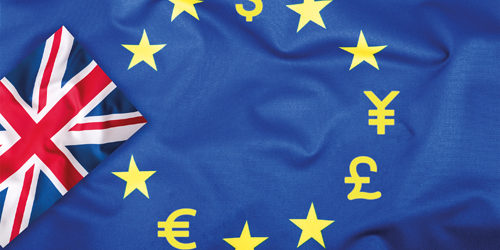
It has been nearly two months since the EU referendum but in that time so much has already happened, and so many new questions about the future of Britain have been raised, that the vote itself is rapidly fading into a dim and distant memory. It will be sometime before the full implications of Brexit are known and we will see exactly what a post-Brexit UK will look like, but the days since the referendum have provided a glimpse of what is in store while that picture takes shape. While the new Prime Minister Theresa May and her Cabinet in Westminster produce a Brexit strategy and then implement it the UK faces a protracted period of uncertainty that presents businesses with both opportunities and challenges.
One of the most immediate and obvious effects of the decision to leave the EU was seen in currency markets. In the hours following the vote sterling dropped to 30-year lows against the dollar, falling by 10%. It also fell by 12% against the Yen and 6% against the Euro.
This is already making life difficult for importers, who are seeing the costs of the goods they buy-in from overseas increase. Those companies that hedged their currency exposure ahead of the referendum to lock in a more favourable exchange rate will have been able to weather the storm and have bought themselves time to adjust to the new currency conditions but those that didn’t will already be looking at their margins and contemplating the options available to them.
One thing they cannot afford to do is ignore the movement and wait for exchange rates to return to pre-Brexit levels. While this could happen, the technical data points to Sterling heading even lower. The Bank of England has already announced a large stimulus package in August and added that unless the economy expands faster than it expects they will cut interest rates again before year end. Sentiment and politics currently outweigh the importance of economic data and in an environment where there is a planned delay of 6 months before Article 50 of the Lisbon Treaty is triggered, as yet no coherent plan for Brexit and a UK Parliament that is taking summer recess, the pound is likely to further test the historic lows we’ve seen against the dollar rather than mount a rally in the short term at least.
Firms reliant on selling into domestic markets are also likely to see tougher trading conditions as consumer confidence shows signs of weakening. The latest YouGov/Cebr Consumer Confidence Index showed a sharp decline since the vote with confi dence now at its lowest point since May 2013. Faced with so much uncertainty, people are growing increasingly concerned about their jobs and future economic wellbeing. As prices rise, we’re likely to see a reduction in non-essential expenditure and big-ticket purchases, putting further pressure on importers.
The picture for exporters is better as a weak sterling means their products are essentially cheaper for foreign buyers while they are also continuing to trade as part of the single European market. Any new trade deals with Europe are likely to take a long time to come into effect, not least while the country rediscovers the art. The UK hasn’t negotiated its own trade deal since 1973 when it handed over responsibility to the EC and, with hundreds required for the task, one estimate puts the number of active trade negotiators in the UK at 20. The likelihood of any new trade deals being struck quickly with the EU and the countries it has trade deals with seems remote and until such times, possibly as late as the end of mid-2018, the UK looks set to trade under its existing rules.
However, exporters face their fair share of challenges too. Despite an unchanged trading situation in the short-term, there are longer-term question marks over the UK’s position in the world and international buyers will be weighing up the risks and uncertainty of dealing with a UK company against other possible options. We’ve already seen businesses lose out on contracts because of uncertainty about their future ability to deliver on their commitments due to Brexit while others entering into multi-year contracts have seen ‘Brexit clauses’ written into them, to protect the client in the event the Brexit fundamentally alters their commercial relationship.
Regardless of whether you’re an importer or an exporter, the Brexit vote is likely to impact how you do business. In the immediate term, this stems from the uncertainty it has thrown up. Rather than reacting in panic or sticking your head in the sand, the key is to be alive to the challenges that uncertainty and changing market conditions present, reassessing strategies and business plans to make sure they remain valid. One of our clients, for example, has already switched from setting prices annually to reviewing quarterly pricing to enable flexibility against this backdrop of uncertainty. Firms should also look to gain certainty where they can. While a GBP/USD exchange rate at below $1.30 may not be as attractive as it was at $1.50 on June 23rd, there is no evidence that it will return to those levels any time soon. Locking in a rate at below $1.30 against at least some of your commitments could be the sensible approach to protect revenues while the dust settles on the economic and political landscape.
For more information on AFEX, contact Nick Yalden (nyalden@afex.com) or Danny Elsey
afex.com. Tel: 0207 004 3884
Trevor is an FCA CF30 approved Senior market adviser with over 25 years of trading and sales experience, include being Head of FX trading at a Japanese Investment House. Trevor’s latest role includes the provision of market analysis to the AFEX client base and managing their FX hedging policies. Trevor provides a weekly blog on the latest FX themes and is often quoted in the UK business press including the Financial Times, The Wall St Journal and The Telegraph.






